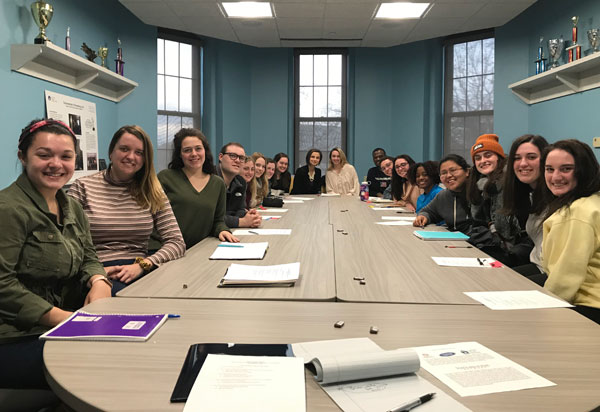President's Blog: From the Heart

Dialogue. Advocacy. Action.
By Eric F. Spina
Whenever I visit a University of Dayton class, I take away valuable lessons.
On one of the final days before students left campus in December, I was invited into Professor Natalie Hudson’s human rights studies capstone course. Over the course of nearly two hours, I scrawled pages of notes as the 17 seniors in Professor Hudson’s critically important capstone course talked about child advocacy, food justice, health care access, gender inequality, global development, privilege, and other systemic issues that require a human rights lens.
These students want to be agents of change in the world, in this country, in our city, and even on our campus. It is clear to me that they take this responsibility seriously — and with humility.
I was impressed by their idealism on one hand and their pragmatism on the other. The quality and impact of our human rights studies faculty and program were very clear to me as the students described their personal evolution over their time at UD. They have hope and faith they will make a difference with the practical and advocacy skills they’ve learned from the highly interdisciplinary human rights studies program. They view their lives as a vocation. And they care deeply about making our campus community inclusive and just.
As part of their capstone experience, one student group worked with community partners to bring diverse people together to share their life stories over a meal. Another teamed with mechanical engineering students to design playscapes to encourage early learning in public spaces in the city. Others worked with Scholars at Risk, an international network of universities and individuals that strives to protect scholars overseas who have been threatened by authoritarian governments.
Finally, a group partnered with students from Flyer Development to support their efforts to empower women by granting microloans for start-up businesses in Nairobi, Kenya. Among other things, the human rights students helped develop the language on the loan applications.
Later, Anna Delaney, a member of the women’s tennis team who double majors in political science, described their motivation: “We wanted to create a language bank of questions to ask on the applications that would resonate and empower these women, who face power struggles in their families and society. We wanted to gain a better understanding of the true struggles and successes of their businesses and gauge how the loans would personally impact them and their families now and in the future. We used our weekly meetings with the business students to discuss how varying microloans impact individuals and communities in different ways, some positive and some negative.”
Words — and actions — matter. We know that on our own campus.
Beyond talking about their remarkable capstone projects and other experiential learning experiences that have taken them around the globe and country, they brought human rights issues home. They offered reflections on racist, homophobic, and other bias incidents on campus — from hateful language written on whiteboards to Pride flags torn down. They made clear their feelings about the casual use of the word “ghetto” for the student neighborhood — and how the label hurts members of our own community. They called for more accountability for hate crimes.
“Being in community,” they told me that day and in a Flyer News’ op-ed, “requires courage.”
Perhaps Anna best articulated the most important lesson, one that I take to heart: “Human rights needs to be taught, but they also need it to be lived on this campus.”
